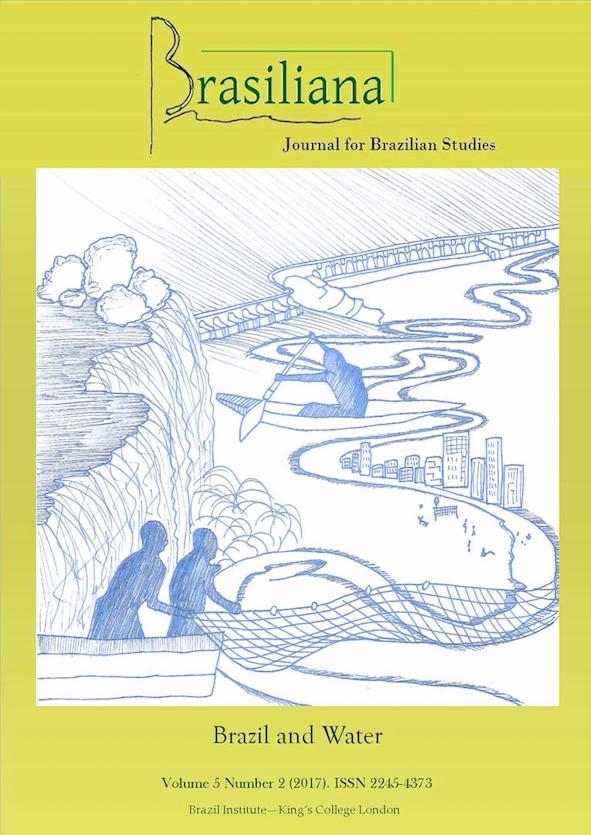Water and the Struggle for Public Space: Social Negotiations in the Usage of Colonial Rio de Janeiro’s Waterworks
Main Article Content
Abstract
The urban space of colonial Rio de Janeiro was to a large degree structured by a water supply system drawn from European models, including aqueducts, fountains, and a network of underground pipes. This infrastructure, however, worked hand in hand with innumerable slaves responsible for the distribution of water from the fountains to individual households. The article analyzes the continuous social negotiation between white elites and Afro-Brazilian slaves regarding the localization, construction, usage, and valorization of the water works and the spaces produced by them. While the elites possessed the power, means, and traditions to design the infrastructure in the first instance, the slaves gave life to it, defined their eventual application and appearance, and more than once caused the white elites modify the works. Thus, by studying the city’s water supply, the article brings to the forefront the slaves’ ability to actively participate in the configuration of the physical and cultural identity of a colonial city.
Article Details
![]()
Articles published in Brasiliana are licensed under a Creative Commons Attribution-NonCommercial-NoDerivs 3.0 Unported License.
When publishing open access, the author signs an author publishing agreement in which they retain copyright and give Brasiliana the right to publish the article. Our Open Access publications are distributed under the terms of the Creative Commons Attribution 4.0 International License, which permits unrestricted use, distribution, and reproduction in any medium, provided the original work is properly cited.
References
Primary Sources Unpublished: Arquivo Histórico Ultramarino (Portugal). Arquivo Nacional do Rio de Janeiro (Brazil). Published: Aguirre, Juan Francisco de, “Diario de Aguirre,” Anales de la Biblioteca 4 (1905). Anderson, Aeneas, A narrative of the British embassy to China in the years 1792, 1793, and 1794 (London: J. Debrett, 1795). Araújo, José de Souza Azevedo Pizarro e, Memorias historicas do Rio de Janeiro e das provincias annexas à jurisdição do vice-rei do Estado do Brasil, vol. 7 (Rio de Janeiro: Silva Porto, 1822). Achivo do Distrito Federal, ed., Revista do Archivo do Distrito Federal, vol. 4 (1897). Arquivo Nacional, ed., Publicações Históricas 15 (Rio de Janeiro: Ministério da Justiça, 1915). Beaglehole, John Cawte, ed., The voyage of the Endeavour, 1768–1771. The journals of Captain James Cook on his voyages of discovery (Cambridge: Hakluyt Soc. at the Univ. Press, 1968). Benci, Jorge, Economia cristã dos senhores no governo dos escravos (livro brasileiro de 1700), ed. Pedro de Alcântara Figueira and Claudinei M. M. Mendes (São Paulo: Grijalbo, 1977). Botero, Giovanni, On the Causes of the Greatness and Magnificence of the Cities, ed. Geoffrey Symcox (Toronto: University of Toronto Press, [2012]). Caldcleugh, Alexander, Travels in South America during the years 1819–20–21. Containing an account of the present state of Brazil, Buenos Ayres, and Chile, vol. 1 (London: John Murray, 1825). Farinha, Bento Jozé de Souza, ed., Colleçam das antigvidades de Evora escriptos por Andre de Rezende, Diogo Mendes de Vasconcellos, Gaspar Estaço, Fr. Bernardo de Brito, e Manoel Severim de Faria (Lisbon: Officina de Filippe da Silva e Azevedo, 1785). Hawkesworth, John, An account of the voyages undertaken by the order of His present Majesty for making discoveries in the Southern Hemisphere, vol. 2 (London: W. Strahan and T. Cadell, 1773). Luccock, John, Notes on Rio de Janeiro and the southern parts of Brazil; taken during a residence of ten years in that country, from 1808 to 1818 (London: Samuel Leigh, 1820). Olanda, Francisco de, Da fabrica que falece a cidade de Lisboa, ed. Vergilio Correia and Alberto Cortês (Madrid: Centro de Estudios Históricos, 1929). Portugal, Luiz de Almeida / Marquês do Lavradio, “Relatório do Marquez de Lavradio, vice-rei do Rio de Janeiro, entregando o governo a Luiz de Vasconcelos e Souza, que o sucedeu no Vice-Reinado,” Revista do Instituto Histórico e Geográfico Brasileiro, vol. 4, n. 16 (1842). Portugal, Luiz de Almeida / Marquês do Lavradio, Cartas do Rio de Janeiro: 1769–1776 (Rio de Janeiro: Arquivo Nacional, 1978). Resende, André de, As Antiguidades da Lusitânia, ed. Raul Miguel Rosado Fernandes (Coimbra: Impr. da Univ. de Coimbra, 2009). Soares, José Carlos de Macedo, ed., Livro primeiro do governo do Brasil, 1607–1633 (Rio de Janeiro: Seção de Publicações do Serviço de Documentação, 1958). Tourinho, Eduardo, ed., Autos de Correições de Ouvidores do Rio de Janeiro, vol. 3 (1748–1820) (Rio de Janeiro: Prefeitura do Districto Federal, 1931). Vaux, James Hardy, Memoirs of James Hardy Vaux, vol. 1 (London: W. Clowes, 1819). Wagner, Robert / Julio Bandeira, ed., Viagem ao Brasil nas aquarelas de Thomas Ender, 1817–1818, vol. 2 (Petrópolis: Kapa, 2000). Walsh, Robert, Notices of Brazil in 1828 and 1829 in two volumes, vol. 2 (Boston: Richardson, Lord & Holbrook, 1831). White, John, Journal of a Voyage to New South Wales (London: J. Debrett, 1790). Secondary Sources Abreu, Mauricio de Almeida, Geografia Histórica do Rio de Janeiro (1502–1700), vol. 2 (Rio de Janeiro: Andrea Jakobsson, 2010). Bueno, Beatriz Piccolotto Siqueira, Desenho e desígnio. O Brasil dos engenheiros militares (1500–1822) (São Paulo: EDUSP, 2011). Delph, Ronald K., “Renovatio, Reformatio, and Humanist Ambition in Rome,” in Heresy, culture, and religion in early modern Italy. Contexts and contestations, ed. Ronald K. Delph, Michelle M. Fontaine and John Jeffries Martin (Kirksville, MO: Truman State University Press, 2006). Lara, Silvia Hunold, Fragmentos setecentistas. Escravidão, cultura e poder na América portuguesa (São Paulo: Companhia das Letras, 2007). Rinne, Katherine Wentworth, The Waters of Rome. Aqueducts, Fountains, and the Birth of the Baroque City (New Haven: Yale University Press, 2010). Rossa, Walter, “Modern Age Aqueducts in Portugal,” in Aqueducts, ed. Vittorio Gregotti (Bologna: CIPIA, 1994). Stinger, Charles L., “Roman Humanist Images of Rome,” in Roma capitale, 1447–1527, ed. Sergio Gensini (Pisa: Pacini, 1994).

